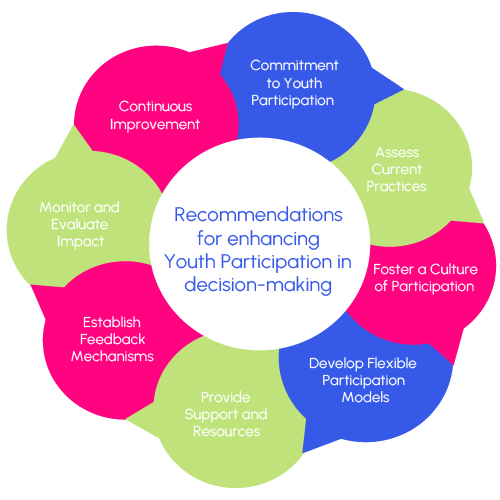New research by NpiY explores youth involvement in decision-making
A new research, part of the “New Power in Youth” Strategic Partnership, explores the practices of youth involvement in decision-making across National Agencies and SALTO Resource Centres. Published in 2024, the research “ Youth involvement in decision-making: a matter of when and how, not if” was led by Artūrs Pokšāns, Gianluca Rossino, Wendla Johanna Schaper, and Seoyoung Park, and co-funded by the Erasmus+ programme of the European Union.
The research sheds light on how youth participation is understood and implemented within national agencies and highlights the mutual benefits of youth involvement for both organizations and the young people they engage with. Through 22 in-depth interviews with agency representatives and young people, as well as discussions at various events, the study uncovers both the successes and challenges of fostering meaningful youth engagement.
Key findings from the research indicate that the level of influence young people have in decision-making ranges from consultations to full participation in decision-making bodies and boards. While the models of participation differ across countries and contexts, common themes emerged: a genuine commitment to youth involvement, organizational flexibility, and a focus on broad, inclusive participation rather than rigid structures.

However, the study also highlights some of the challenges: young people sometimes felt their contributions lacked tangible impact, while professionals struggled to find effective ways to engage youth in meaningful roles. In the most successful cases, both sides found points of cooperation where mutual understanding and trust could thrive.
The research identifies several strategies for enhancing youth involvement, including fostering a culture of participation, ensuring flexibility in engagement approaches, adopting inclusive recruitment practices, offering adequate support and investment, and emphasizing a bottom-up approach. One of the key takeaways is the importance of institutions being open to experimentation, which can lead to long-term, sustainable mechanisms of youth participation.
Read the full research here
participationpool.euExplore best practices for effective youth participation by JUGEND für Europa in Germany and the Dutch National Agency for Erasmus+ and European Solidarity Corps here:
participationpool.euRead why it is so important to involve the target groups in the decision-making here
participationpool.eu




